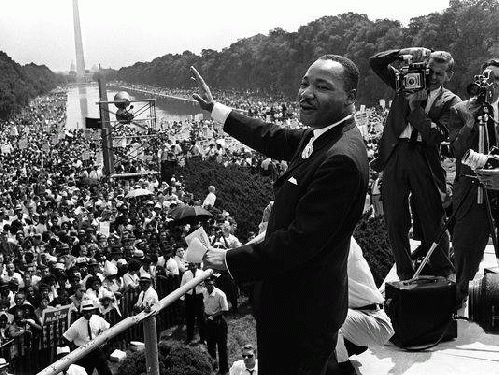Our political leaders have hyped it, some would say abused or misused it for their own purposes, but bend it, twist it, turn it upside down -- it will not be broken.
It remains one of the most powerful, truthful, ground-breaking speeches ever uttered. Fifty years ago, Dr. Martin Luther King, Jr. spoke from Washington DC about the dream of racial equality in this nation, sparked a revolution that could no longer be ignored, and set a new watermark for all political speeches to follow.
The Detroit Free Press has this remembrance:
"When the Rev. Martin Luther King Jr. took the lectern at the March on Washington 50 years ago to deliver his 'I Have a Dream' speech, the text in his hand didn't contain the words 'I have a dream.'
"That refrain, and the part of the address it punctuated and propelled, was improvised on the spot. Having written a good speech -- a working title was 'Normalcy -- Never Again' -- King instead gave one of the greatest of the 20th century.
"There are other things that most of us don't know about this storied speech. The march wasn't King's first use of the 'dream' refrain. He came to rue the phrase, and by the time he died, the speech had faded from public memory.
"King spoke on Aug. 28, 1963, at the biggest, most important civil rights demonstration in American history. It was the heart of the civil rights movement -- eight years after the anti-segregation Montgomery bus boycott; three years after the lunch-counter sit-ins in Nashville and Greensboro, N.C.; two years after the first Freedom Rides on interstate buses through the South; and three months after police in Birmingham, Ala., horrified the nation by using attack dogs and fire hoses against women and children protesting segregated public facilities.
"At least 250,000 people had jammed the National Mall to demand 'jobs and freedom,' including passage of a civil rights bill. But all many people know or remember is King, preaching a gospel of hope from the steps of the Lincoln Memorial.
"On the day of the march, more than two-thirds of Negroes (as African Americans were then known) lacked the right to vote, attend integrated schools or use the same public facilities as whites.
"But King's movement finally had made civil rights the nation's top domestic political issue. The summer would see 1,122 civil rights demonstrations around the nation and about 20,000 arrests, almost all in the South.
"On the Wednesday morning of the march, Washington was tense. Outside the city, thousands of combat troops were ready to move in, in case of trouble. Many businesses were closed. White House lawyers had drawn up martial-law orders for President Kennedy to sign if necessary.
"The crowd gathered slowly at the Washington Monument and marched to the Lincoln Memorial, where the movement's leaders would address them. King, not yet 35, went last.
"He had worked on the speech over the previous four days, finally finishing a few hours before dawn in his suite at the Willard Hotel.
"As millions watched on television -- all three networks had cut away from regular programming -- King began reading from typed text. He invoked the words of the president whose likeness loomed in the background: 'Five score years ago...' King said, the Emancipation Proclamation 'came as a joyous daybreak to end the long night' of the slaves' captivity.
"But 100 years later, he said, 'the Negro still is not free.' The promises of Lincoln's proclamation, the Constitution and the Declaration of Independence were like a 'bad check.' Now, he said, we're here to cash it.
(Note: You can view every article as one long page if you sign up as an Advocate Member, or higher).





